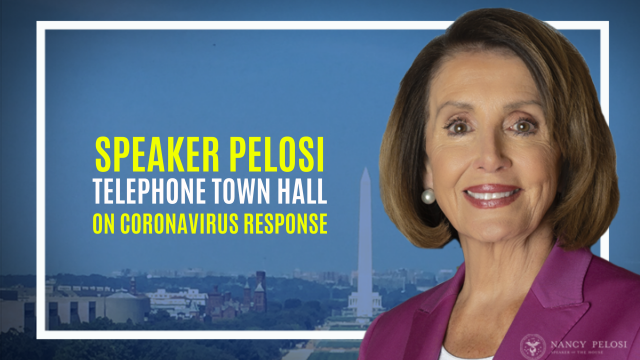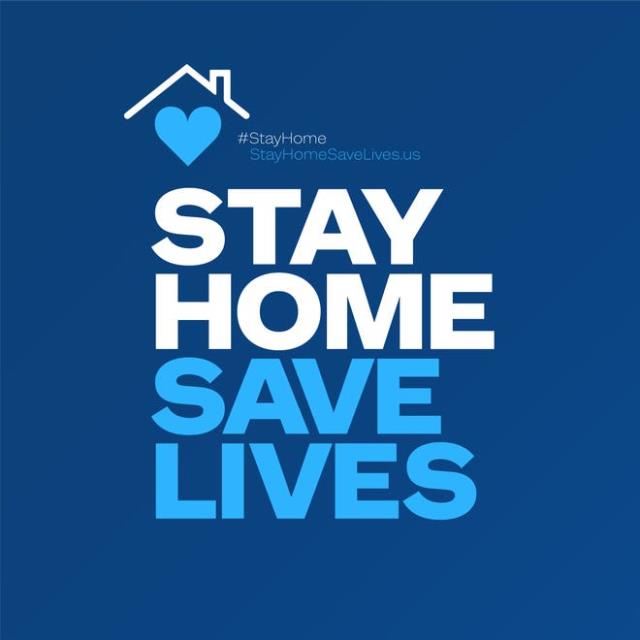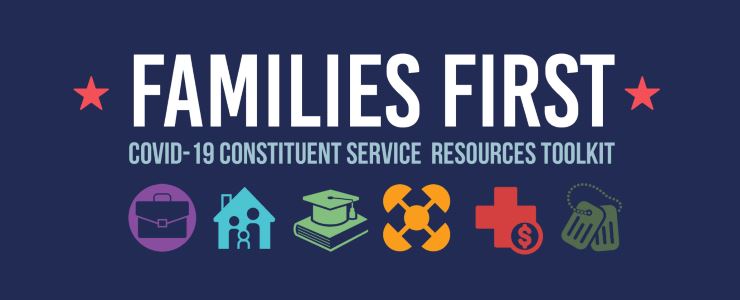|
Dear San Franciscan,
You are invited to join me for a telephone town hall for San Franciscans on the coronavirus pandemic and Congress' ongoing response on Monday, April 6, 2020 at 5:00 p.m.
We will discuss passages of the CARES Act, the third coronavirus response package that builds on the progress of the bipartisan, $8.3 billion emergency funding supplemental and the Families First Coronavirus Response Act.
To join this town hall, please call in to (833) 261-6164. You are invited to submit questions. We hope to hear from you!

Our nation is facing one of the gravest health and economic emergencies in over 100 years. The coronavirus pandemic has had a deep impact on every aspect of American life — and bold action is required to address the health emergency, mitigate the economic damage and provide for a strong recovery. Since the beginning of the pandemic, House Democrats have focused on ensuring our nation’s response puts workers and families first: their health, their wages and their well-being.
We have already passed and signed into law:
• The Coronavirus Preparedness and Response Supplemental Appropriations Act
• The Families First Coronavirus Response Act
• The Coronavirus Aid, Relief and Economic Security (CARES) Act
I am proud to support these historic pieces of legislation that will bring urgently needed relief to families and small businesses all across this country, including in California. During this time of stress and uncertainty, every American needs to know that their government is there to support them without hesitation. This latest piece of legislation, the CARES Act, is an important step in our ongoing effort to act decisively on behalf of the American people and ensure workers and families have the resources they need today and throughout this unprecedented crisis.

Here are just a few of the numerous initiatives in this historic piece of legislation that will benefit the residents of California.
Transportation:
- This bill provides $25 billion in grants to transit agencies nationwide, $3.75 billion of which will go to California, to ensure continued operation of transit services. $1.3 billion will go to Bay Area transit agencies. It also eliminates any requirement that transit agencies use their own funds to receive federal assistance and maintains key worker protections.
- Another $10 billion in grants will provide aid to airports. San Francisco International Airport will receive $254 million.
Housing Opportunities for Persons with AIDS:
- $65 million is being provided to maintain operations, rental assistance, supportive services, and other necessary actions to mitigate the impact of coronavirus on low-income persons with HIV/AIDS. San Francisco will receive $1 million.
Homeless and Housing:
- $4 billion has been allocated for Emergency Solutions Grants to address the impact of coronavirus among individuals and families who are homeless or at risk of homelessness and to support additional homeless assistance, prevention, and diversion activities. San Francisco will receive $5.5 million in Homeless Assistance Grants in the first round with more on the way.
- Another $5 billion will go towards Community Development Block Grants, with San Francisco receiving $11 million in the first round with more on the way.
Together, the three sweeping pieces of legislation dramatically expand critical financial lifelines for families, establish new benefits and protections for workers, create new tools for small businesses to meet payroll and other expenses, and provide relief for students and schools. This Families First Coronavirus Constituent Service Resource Toolkit (also available in Spanish) will help you understand all the benefits that are available to you and your community — and how to access them.

Individuals and Families
Unemployment Insurance
- More laid-off and furloughed workers than ever before (including those new to the job market) will be eligible for Unemployment Insurance and will see an additional $600 per week to match the average paycheck for up to 4 months of benefits. These benefits will be available immediately.
- Residents seeking more information about UI benefits should visit the California Employment Development Department here.
Direct Payments to Individuals and their Families
- Individuals making up to $75,000 ($150,000 for married workers) will receive payments of $1,200 with an additional $500 payment per minor child. The payments decrease ratably and stop altogether for single workers making more than $99,000 ($198,000 for married workers and $218,000 for a family of four.)
- These payments will be issued by the IRS via direct deposit and will be based on 2019 or 2018 tax return or 2019 Social Security statement.
- If someone has not filed a tax return in 2018 or 2019 and does not receive Social Security benefits, the IRS recommends filing a 2018 return to receive payment. If the IRS does not have the taxpayer’s bank account information, the taxpayer should look for a letter from the IRS detailing how to receive their payment.
- Earlier this week, the IRS released guidance that, in general, Social Security beneficiaries who did not file a 2018 or 2019 return would need to file an income tax return to receive the direct payments, and that’s since been resolved. On Wednesday, The U.S. Department of the Treasury and the IRS announced that such Social Security beneficiaries will not need to file an abbreviated tax return to receive an Economic Impact Payment. Instead, payments will be automatically deposited into their bank accounts to the extent the Social Security Administration has banking information or will be paid through a check. Click here for more information from the IRS.
- The IRS is also urging taxpayers to be on the lookout for a surge of calls and email phishing attempts about the Coronavirus, or COVID-19. These contacts can lead to tax-related fraud and identity theft. For more information, please visit here.
Food Assistance
- Supplemental Nutrition Assistance Program (SNAP), more commonly known as food stamps, ensures that Americans receive the food they need, especially if they are newly unemployed. Congress has invested in SNAP in the last three bills to help Americans put food on the table during this crisis.
- The Special Supplemental Nutrition Program for Women Infants and Children (WIC) provides access to nutritious foods to low-income pregnant women or mothers. To see if you are eligible for WIC benefits click here. To learn more about how to apply for WIC click here. To learn about WIC in your state, click here.
Food Banks
- Congress has now secured $850 million in emergency funding for The Emergency Food Assistance Program (TEFAP) to help food banks face increased utilization and demand in countless communities across the country due to the coronavirus. Click here for your state contacts or find a local food bank near you.
- To find food assistance near you, call the USDA National Hunger Hotline 1-866-3-HUNGRY/1877-8-HAMBRE
Homeowners and Renters Protections
- Mortgage Forbearance: Homeowners with FHA, USDA, VA, or Section 184 or 184A mortgages (for members of federally-recognized tribes) and those with mortgages backed by Fannie Mae or Freddie Mac have the right to request forbearance on their payments for up to 6 months, with a possible extension for another 6 months without fees, penalties, or extra interest. Homeowners should contact their mortgage servicing company directly.
- Eviction Protections: Renters residing in public or assisted housing, or in a home or apartment whose owner has a federally-backed mortgage, and who are unable to pay their rent, are protected from eviction for 4 months. Property owners are also prohibited from issuing a 30-day notice to a tenant to vacate a property until after the 4-month moratorium ends. This protection covers properties that receive federal subsidies such as public housing, Section 8 assistance, USDA rural housing programs, and federally-issued or guaranteed mortgages. Renters whose landlord is not abiding by the moratorium should contact the relevant federal agency that administers their housing program or their local Legal Aid office.
Energy Assistance for Low Income Families
- This legislative package includes $900 million to help low income Americans and their families heat and cool their homes. To learn more about the Low Income Home Energy Assistance Program (LIHEAP) in your state, click here.
Emergency Paid Leave
- Many workers in America currently have no paid leave and are being forced to choose between their paycheck, their health, and the health of the people around them.
- The emergency paid leave provisions passed by Congress and signed into law by the President are a critical step toward protecting families’ financial security and mitigating the spread of the coronavirus.
Small Businesses
Small Business Forgivable Loans and Grants
- Congress secured $350 billion in forgivable loans and $10 billion in grants to small businesses, tribal business concerns, and certain nonprofits.
- Loans through a new SBA 7(a) Paycheck Protection Program can be forgiven when used for payroll costs (including paid leave, health care, and other costs) to retain workers, and other expenses such as rent, mortgage interest, and utilities. Independent contractors, sole-proprietors, and other self-employed persons are eligible for these loans.
- Small businesses can also apply for up to $10,000 in grants to retain workers and pay for debt obligations.
- Small businesses, tribal business concerns, 501(c)(3) nonprofits, and 501(c)(19) veterans organizations in your district should contact their lender and the Small Business Administration office directly. For a list of SBA offices by state with contact information please click here.
Paid Sick and Family Leave Tax Credit
- Employers who provide required leave to their employees and who employ less than 500 employees are eligible for a tax credit to offset the costs of such leave. This tax relief will be provided against quarterly payroll taxes (those paid in connection the Form 941). For additional guidance, please refer to the IRS’s website.
Students and Educators
Student Loan Relief for Borrowers
- If you have student loan debt, Congress secured several options outlined below for borrowers that help provide relief through September 30, 2020. During this period, a borrower will be able to:
- Pause payments for federal student loan borrowers who have Direct Loans and Federal Family Education Loan (FFEL), which means these borrowers will not be required to make any payments toward outstanding interest or principal balance.
- Suspend interest accrual for such loans so that these balances don’t accrue.
- Avoid forced collections such as garnishment of wages, tax refunds, & Social Security benefits.
- Halt negative credit reporting.
- Ensure a borrower continues to receive credit toward Public Service Loan Forgiveness, Income-Driven Repayment forgiveness, and loan rehabilitation.
- For additional guidance on how to apply and learn about next steps as this critical relief becomes available, please refer to the U.S. Department of Education website.
School Meals
- As more schools close due to coronavirus, Congress has provided emergency funding for Child Nutrition Programs to ensure students can still receive their free or reduced-price school meals during this time. Click here to learn more about what your state is doing during this time.
Stabilization Funding For Education
- Congress secured $30.75 billion in funding for school districts, states and higher education institutions to ensure state resources and investments are not diverted from life-long learning. For additional guidance on how to apply and learn about next steps as this critical relief becomes available, please refer to the U.S. Department of Education website.
Indian Country
- Indian Health Service: Congress secured over $1 billion in critically needed resources to the Indian Health Service (IHS). Information on the federal response in Indian Country can be found on the IHS website.
- Coronavirus Relief Fund: Democrats secured an $8 billion relief fund at the Department of Treasury to assist tribes with costs incurred in the response to the coronavirus pandemic. For additional guidance on how to apply and learn about next steps as this critical relief becomes available, please refer to the U.S. Department of Treasury website.
- Tribal Governance: The legislative package provides $453 million to the Bureau of Indian Affairs (BIA) for essential tribal governmental and to aid individual Native Americans. For resources and information on school closures, please visit the BIA website here.
- Housing: This legislative package provided $300 million for programs within the Department of Housing and Urban Development’s Office of Native American Programs. Resources can be found here.
- Small Business: The legislative package makes tribal business concerns eligible for SBA loans of up to $10 million and SBA grants of up to $10,000 for payroll costs to retain workers (including paid leave, health care, and other costs), and other expenses such as rent, mortgage interest, and utilities.
- Unemployment Benefit Costs: Congress is also allowing for tribes to be reimbursed for one-half of incurred unemployment benefit costs through December 31, 2020.
Veterans
- Congress provided robust emergency funding to ensure the Department of Veterans Affairs (VA) has the equipment, tests, and support services – including setting up temporary care sites, mobile treatment centers and increasing telehealth visits to allow more veterans to get care at home – necessary to provide veterans with the additional care they need. For further guidance as this funding and initiatives are implemented, please refer to the U.S. Department of Veterans Affairs website.
|